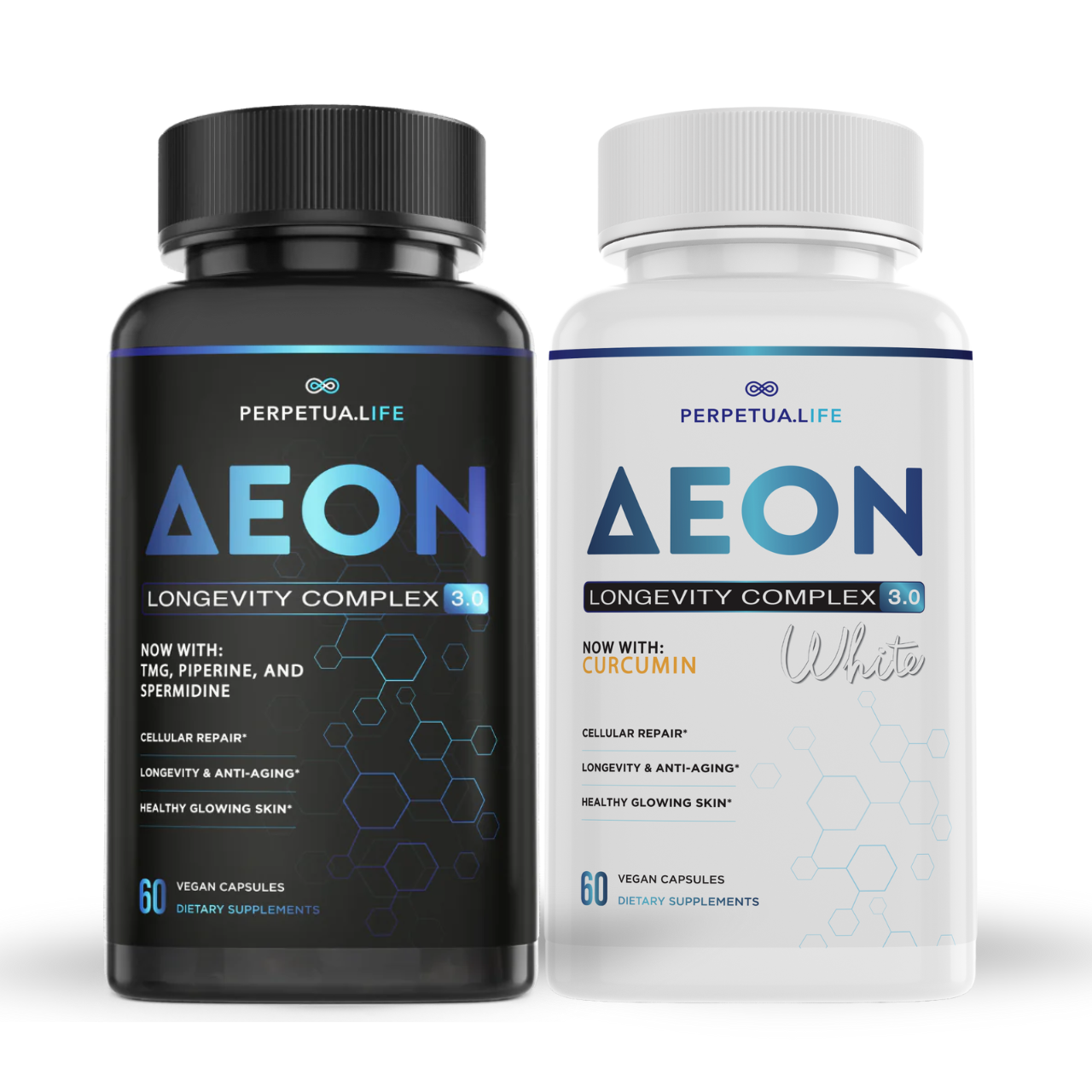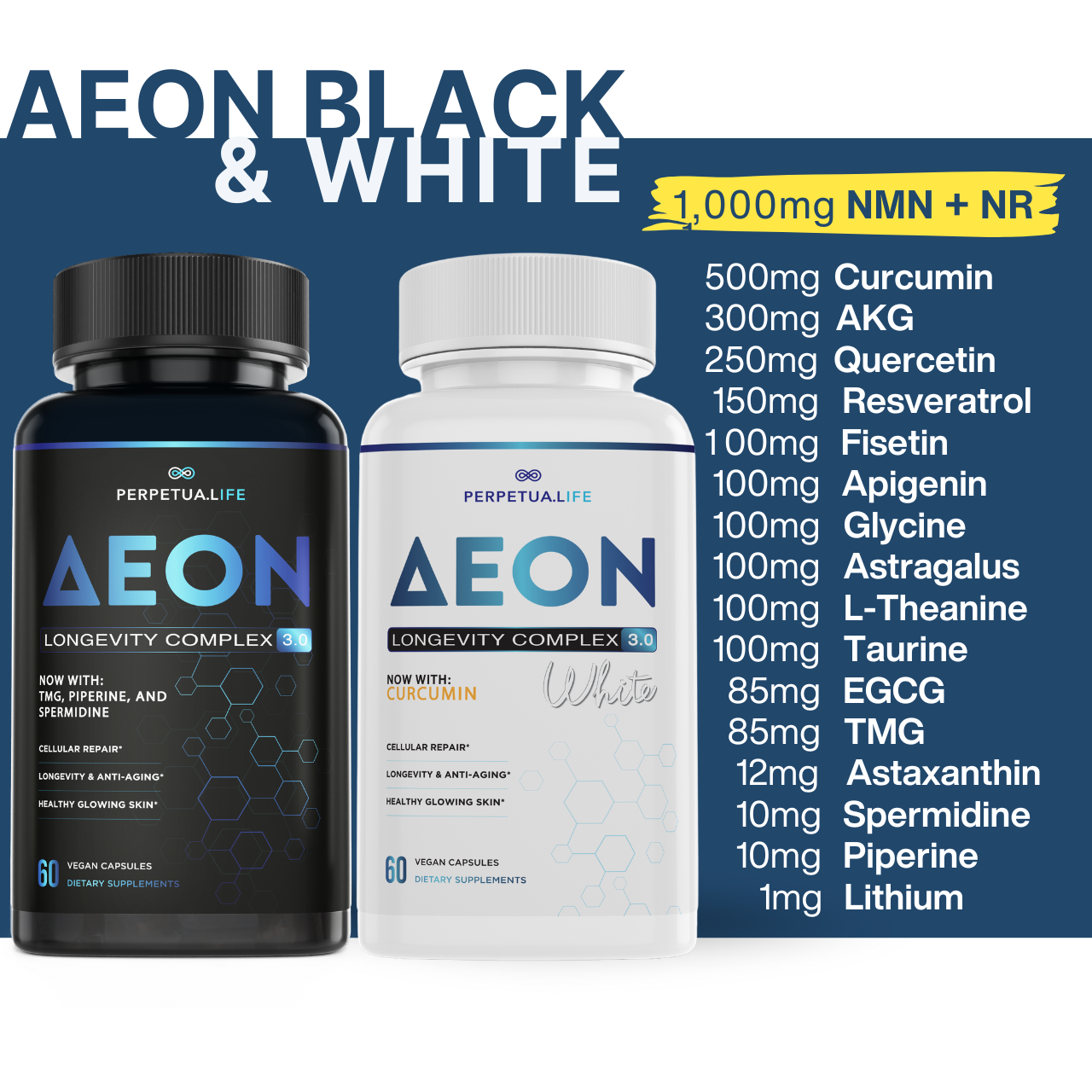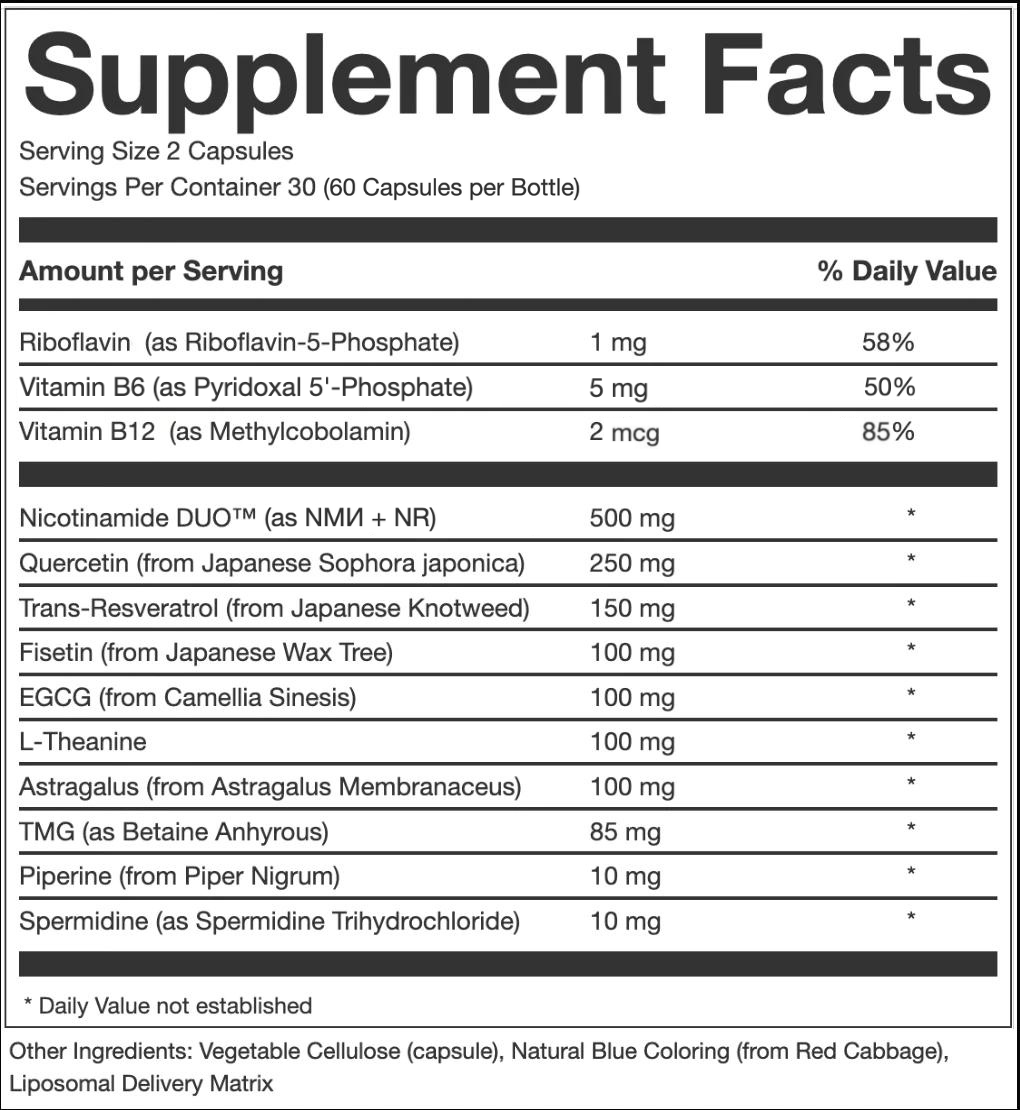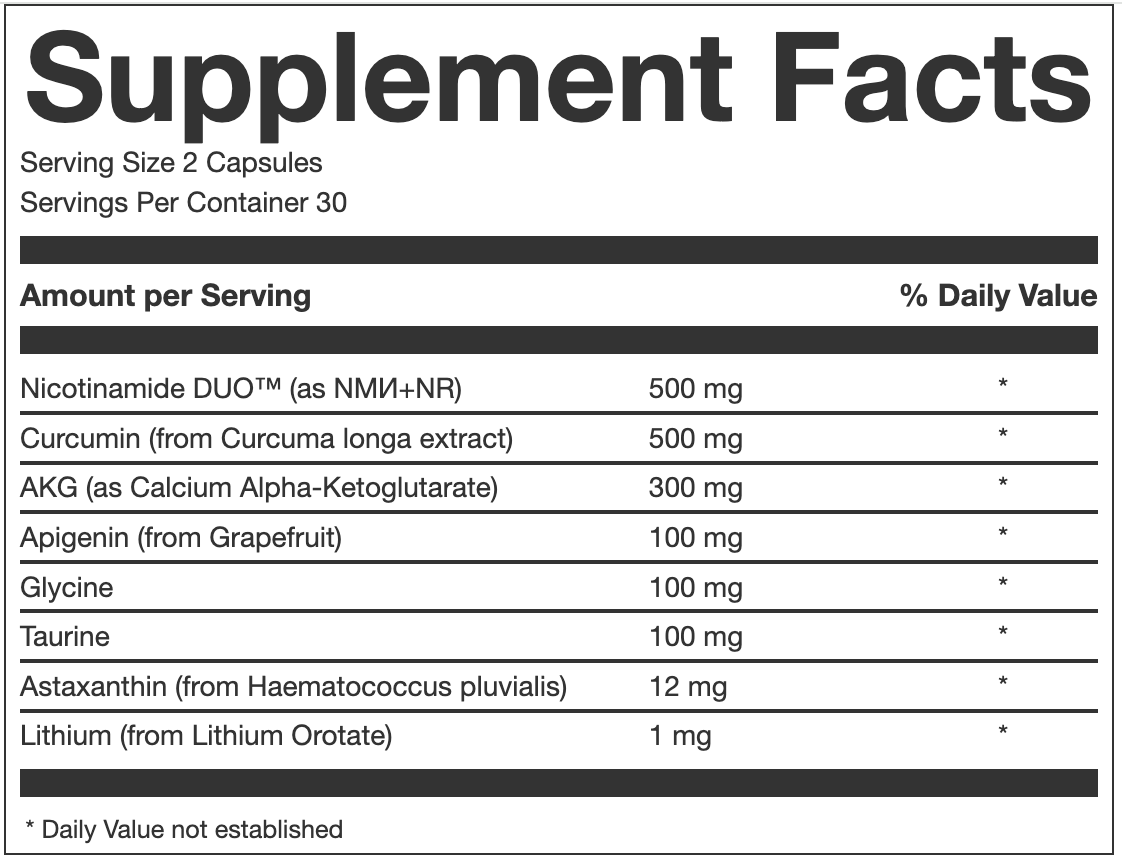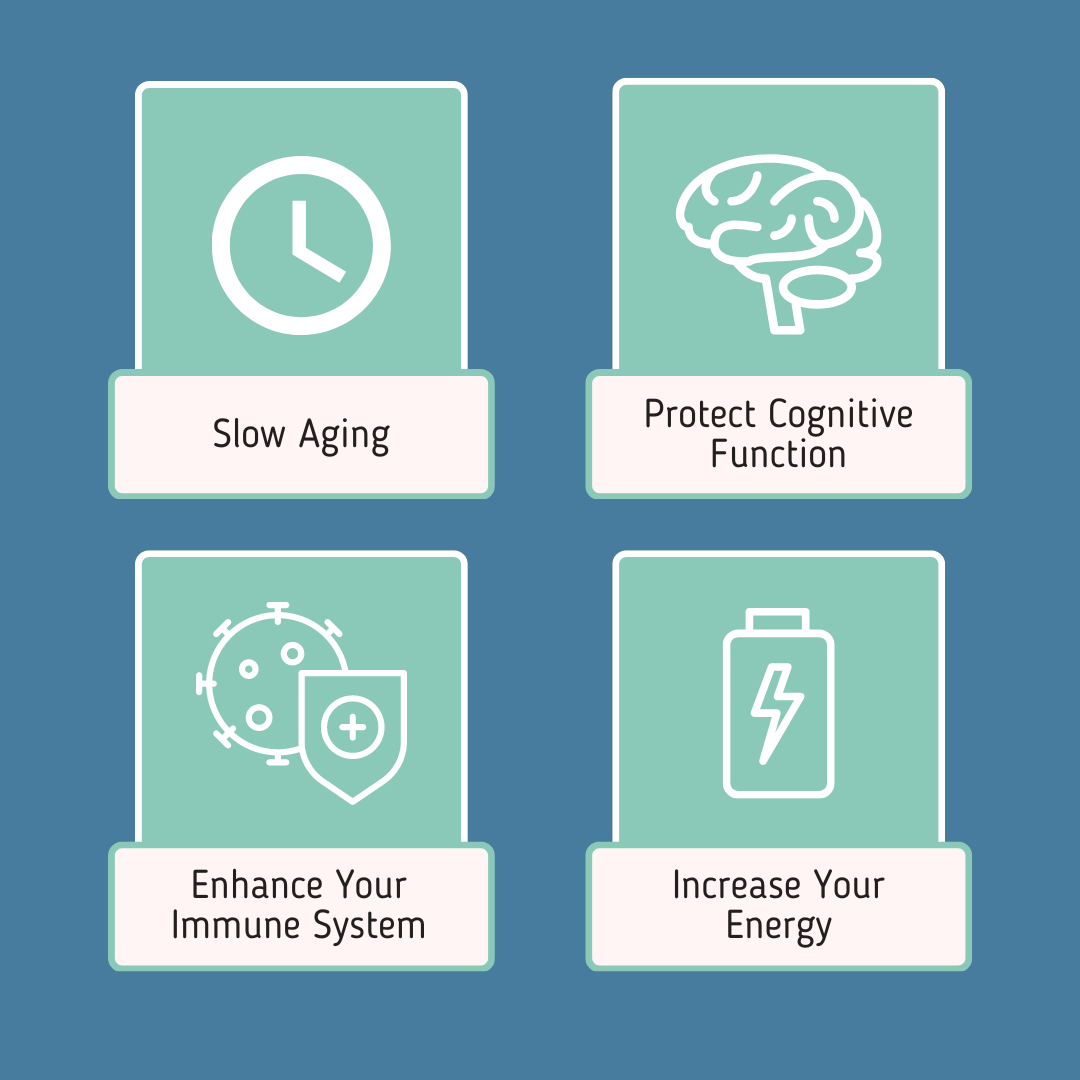1
/
de
6
Perpetua.life
AEON Anti-age 11-Complex Supplement avec Nicotinamide, Fisetin, Quercetin, Resvératrol, Astragalus, et plus.
AEON Anti-age 11-Complex Supplement avec Nicotinamide, Fisetin, Quercetin, Resvératrol, Astragalus, et plus.
Prix habituel
$84.99 USD
Prix habituel
$99.00 USD
Prix promotionnel
$84.99 USD
Prix unitaire
/
par
Frais d'expédition calculés à l'étape de paiement.
Impossible de charger la disponibilité du service de retrait
"Amazing"
Rated 4.4/5 on

DESCRIPTION:
AEON™ Black & White is the World’s best anti-aging supplement bundle and the only one that combines powerful NAD+ precursors in a full spectrum 20-compound liposomal complex.
Take AEON Black in the AM to experience an all day energy boost and enhanced sense of well-being.
Follow that up by taking AEON White in the evening, before bed, to experience a deep and reinvigorating nights sleep.

Our formula is bound to a Liposomal Delivery Matrix that increases the absorption of each compound by 200-300% (source). SO LESS IS MORE!
AEON is free of preservatives, additives, gluten, animal derived ingredients, and has 0 calories. It's made in the USA, and rigorously tested by 3rd party labs for both potency, AND heavy metals to ensure you receive a premium product each, and every time (latest rest).
*This products formulation is kept up to date with the latest longevity research so the formula/ingredients may change slightly over time.
NICOTINAMIDE DUO:
Nicotinamide DUO™ (NMИ, NAD+) has been shown to have a variety of benefits including:
✅ 1. Increased Energy and Reduced Fatigue:
NMИ helps increase NAD+ levels, which are essential for mitochondrial energy production in cells.
This can lead to increased energy levels, reduced fatigue, and improved physical performance.
✅ 2. Improved Muscle Function and Strength:
NMИ may help reverse age-related declines in muscle strength and size, which is called sarcopenia.
Studies have shown that NMИ can improve muscle strength, endurance, and oxygen utilization in older adults and athletes.
✅ 3. Enhanced Cognitive Function:
Some research suggests that NMИ may improve cognitive function and protect against age-related cognitive decline, including in models of Alzheimer's disease.
This could be due to NMИ's ability to enhance energy metabolism in brain cells and reduce oxidative stress.
✅ 4. Protection Against Age-Related Decline:
NMИ may help protect against various age-related declines, including those in the cardiovascular system, kidneys, liver, and other organs.
It can also help maintain the integrity of the blood-brain barrier, which is important for brain health.
✅ 5. Other Potential Benefits:
Improved Insulin Sensitivity:
NMИ may improve insulin sensitivity, which is important for maintaining blood sugar levels and preventing conditions like type 2 diabetes.
Reduced Age-Associated Weight Gain:
NMИ may help suppress age-related weight gain and improve body composition.
CURCUMIN:
Curcumin, the active compound in turmeric, is known for a variety of health benefits, primarily due to its anti-inflammatory and antioxidant properties.
Here are the main benefits:
✅ Anti-inflammatory effects: Curcumin can help reduce chronic inflammation, which is linked to conditions like arthritis, heart disease, and metabolic syndrome.
✅ Antioxidant activity: It neutralizes free radicals and boosts the body’s own antioxidant enzymes, potentially slowing aging and reducing oxidative stress.
✅ Joint health: Especially in osteoarthritis and rheumatoid arthritis, curcumin may reduce pain and improve mobility.
✅ Brain health: It may increase brain-derived neurotrophic factor (BDNF), which supports neuron growth and function—potentially improving memory and reducing risk of brain diseases.
✅ Heart health: Curcumin can improve endothelial function (lining of the blood vessels), which supports cardiovascular health and may lower the risk of heart disease.
✅ Cancer prevention potential: Some studies suggest curcumin may help prevent or slow the growth of certain cancers, though more clinical research is needed.
✅ Digestive health: It may help in managing conditions like inflammatory bowel disease and indigestion.
✅ Mood support: Curcumin has shown potential antidepressant effects in some studies, possibly through its influence on neurotransmitters and inflammation.
✅ Blood sugar control: There’s evidence suggesting curcumin can help improve insulin sensitivity and regulate blood glucose levels.
✅ Skin health: Its anti-inflammatory and antimicrobial properties may benefit skin conditions like acne, psoriasis, and eczema.
AKG:
Alpha-Ketoglutarate (AKG) is a naturally occurring compound involved in the Krebs cycle (energy production) and amino acid metabolism. It's gaining attention for its potential anti-aging, metabolic, and performance-enhancing benefits.
Here are the main benefits:
✅ Cellular energy production: AKG is a key player in the Krebs cycle, helping convert nutrients into energy (ATP), especially in muscle and brain cells.
✅ Anti-aging potential: Studies, particularly in animals, suggest AKG may extend lifespan and improve healthspan by reducing systemic inflammation and promoting cellular repair.
✅ Supports muscle health: AKG may help preserve lean muscle mass, particularly in aging individuals, and support recovery during catabolic stress or intense exercise.
✅ Bone health: AKG has been linked to improved bone mineral density and strength, potentially by influencing collagen synthesis and calcium absorption.
✅ Gut health: It may help maintain intestinal integrity, reduce gut inflammation, and support nutrient absorption, especially in older adults or those with compromised digestive systems.
✅ Ammonia detoxification: AKG helps in removing excess nitrogen/ammonia from the body, which is particularly important in conditions involving muscle breakdown or liver dysfunction.
✅ Immune support: AKG plays a role in immune cell metabolism and may enhance immune responses, particularly during stress or illness.
✅ Cognitive support: By supporting mitochondrial function and reducing oxidative stress, AKG might help protect brain cells and improve mental clarity or cognitive endurance.
✅ Wound healing and tissue repair: It supports collagen synthesis and cellular regeneration, aiding recovery after injury or surgery.
✅ Improved exercise performance: Some evidence suggests it might reduce fatigue, support endurance, and enhance recovery by optimizing energy metabolism and reducing lactic acid buildup.
QUERCETIN:
Quercetin is a plant flavonoid found in many fruits, vegetables, and grains—especially onions, apples, and berries. It's widely used as a dietary supplement for its antioxidant, anti-inflammatory, and immune-supporting properties.
Here are the key potential benefits of taking quercetin:
✅ 1. Powerful Antioxidant
What it does: Neutralizes free radicals and reduces oxidative damage to cells and tissues.
Why it matters: Oxidative stress is linked to aging, cancer, and neurodegenerative diseases.
✅ 2. Anti-Inflammatory Effects
Inhibits inflammatory enzymes and cytokines (like TNF-α, IL-6).
May help reduce symptoms of chronic inflammatory conditions such as arthritis or allergies.
✅ 3. Supports Immune Function
Enhances immune response while modulating excessive inflammation.
Studied for use in viral infections (e.g., colds, flu, even COVID-19 adjunctive therapy) due to antiviral and immune-balancing effects.
✅ 4. Allergy Relief
Acts as a natural antihistamine by stabilizing mast cells and reducing histamine release.
May help alleviate hay fever (allergic rhinitis) and seasonal allergies.
✅ 5. Heart Health
May reduce blood pressure, improve endothelial function, and lower LDL oxidation.
Helps relax blood vessels through nitric oxide modulation.
✅ 6. Blood Sugar Control
Improves insulin sensitivity and lowers blood glucose levels in some studies.
May be helpful for people with metabolic syndrome or type 2 diabetes.
✅ 7. Brain Health & Neuroprotection
May protect brain cells from oxidative damage and inflammation.
Early evidence suggests benefits for memory and cognitive decline.
✅ 8. Exercise Recovery
May reduce exercise-induced inflammation and oxidative stress, helping with muscle recovery and performance.
RESVERATROL:
Resveratrol is a natural polyphenol found in red grapes, wine, berries, and peanuts. It has gained attention for its potential health benefits, especially related to aging and chronic diseases.
Here's a summary of the main potential benefits of taking resveratrol:
✅ 1. Antioxidant Effects
What it does: Neutralizes free radicals that damage cells.
Why it matters: May reduce oxidative stress, a contributor to aging and disease.
✅ 2. Heart Health
Improves endothelial function: Helps arteries stay flexible and improves blood flow.
Reduces LDL cholesterol oxidation: May help prevent plaque buildup in arteries.
Mild blood pressure-lowering effects.
✅ 3. Anti-Inflammatory Properties
Resveratrol may reduce markers of inflammation such as CRP and TNF-α, potentially beneficial for conditions like arthritis or metabolic syndrome.
✅ 4. May Support Brain Health
Neuroprotective effects: Animal studies suggest it may protect against cognitive decline by reducing oxidative stress and inflammation in the brain.
May enhance cerebral blood flow and potentially benefit memory.
✅ 5. Potential Anti-Aging Effects
Activates sirtuins (especially SIRT1), proteins associated with cellular health and longevity.
Mimics some effects of caloric restriction, which is linked to lifespan extension in various organisms.
✅ 6. Blood Sugar Regulation
May improve insulin sensitivity and help regulate blood glucose levels, especially in people with type 2 diabetes.
✅ 7. Anti-Cancer Potential
Laboratory studies show it may inhibit cancer cell growth and promote apoptosis (cell death) in some cancers, though human evidence is still limited.
FISETIN:
Fisetin is a naturally occurring flavonoid found in strawberries, apples, grapes, onions, and cucumbers. It's gaining attention for its unique role as a senolytic agent, meaning it helps clear out "senescent" cells—damaged cells that no longer divide and contribute to aging and disease.
Here are the main potential benefits of taking fisetin:
✅ 1. Senolytic Activity (Anti-Aging)
Clears senescent cells, which accumulate with age and promote inflammation and tissue damage.
May slow biological aging and improve tissue function in organs like the brain, liver, and kidneys (shown in animal studies).
One of the most promising natural compounds for healthy longevity support.
✅ 2. Brain and Cognitive Health
Crosses the blood-brain barrier and may protect against neurodegeneration.
Shown to improve memory and reduce cognitive decline in animal models of Alzheimer’s.
Reduces brain inflammation and oxidative stress.
✅ 3. Potent Antioxidant
Neutralizes free radicals and enhances glutathione levels, the body’s master antioxidant.
Helps protect cells and DNA from oxidative damage.
✅ 4. Anti-Inflammatory Effects
Suppresses pro-inflammatory cytokines (like IL-6, TNF-α).
May help manage chronic inflammatory conditions such as arthritis or metabolic syndrome.
✅ 5. Supports Metabolic and Cardiovascular Health
Improves insulin sensitivity and may lower blood sugar.
Potential to lower cholesterol and reduce arterial inflammation.
✅ 6. May Have Anti-Cancer Properties
In lab studies, fisetin has shown the ability to inhibit tumor growth, induce cancer cell death, and prevent metastasis.
Human studies are very limited but ongoing.
APIGENIN:
Apigenin is a natural flavonoid found in parsley, chamomile, celery, and other plants. It's gaining popularity for its potential health and anti-aging benefits, particularly in relation to sleep, inflammation, and cellular health.
Here are the main benefits of taking apigenin:
✅ 1. Promotes Sleep and Relaxation
Acts on GABA receptors in the brain (similar to how sedatives like benzodiazepines work, but more gently), helping promote relaxation and improve sleep quality without causing dependence or grogginess.
✅ 2. Reduces Anxiety and Stress
Its interaction with GABA and other neurotransmitters also gives it mild anxiolytic (anti-anxiety) effects, useful for reducing stress and calming the nervous system.
✅ 3. Anti-inflammatory Properties
Apigenin helps inhibit pro-inflammatory enzymes and cytokines, which can support overall immune health and may help with chronic inflammatory conditions.
✅ 4. Antioxidant Effects
It scavenges free radicals and enhances the body’s natural antioxidant defense systems, supporting cellular health and longevity.
✅ 5. Hormonal Balance (Potentially Inhibits Aromatase)
Apigenin may inhibit aromatase, the enzyme that converts testosterone into estrogen. This has led to interest in its potential use for male hormonal support or managing estrogen-dominant conditions.
✅ 6. Supports Brain Health and Neuroprotection
It can help protect neurons from oxidative damage and inflammation, potentially supporting cognitive function and long-term brain health.
✅ 7. May Support Anti-Cancer Activity
In lab studies, apigenin has shown potential to inhibit the growth of various cancer cells (including breast, prostate, and colon) through mechanisms like inducing apoptosis and inhibiting angiogenesis. Clinical data is still early-stage.
✅ 8. Cardiovascular Support
Apigenin may help relax blood vessels, reduce blood pressure, and protect the heart from oxidative and inflammatory damage.
✅ 9. Longevity and Senescence
Preliminary research suggests apigenin may help reduce cellular senescence (aging cells that no longer function properly), which could contribute to healthier aging.
GLYCINE:
Glycine is a simple yet powerful amino acid with a wide range of health benefits. It plays key roles in the brain, metabolism, connective tissue, and sleep.
Here are the main benefits of taking glycine:
✅ 1. Improved Sleep Quality
Glycine calms the nervous system and helps lower core body temperature, promoting deeper and more restful sleep.
Studies show that even low doses (3g before bed) can reduce sleep latency (time to fall asleep) and improve sleep efficiency.
✅ 2. Cognitive and Mental Health Support
Acts as a neurotransmitter in the brain—modulating glutamate and NMDA receptors—which can enhance memory, focus, and emotional stability.
May support mood and reduce symptoms of anxiety or schizophrenia, particularly in higher doses.
✅ 3. Anti-Aging and Longevity
Glycine has been shown to reduce oxidative stress, inhibit inflammation, and support mitochondrial function—all crucial for healthy aging.
Animal studies suggest that glycine may extend lifespan by improving metabolic health and reducing chronic inflammation.
✅ 4. Collagen Production & Joint Health
Glycine is a major component of collagen, which supports skin elasticity, joint function, ligaments, and tendons.
It can help with wound healing and reducing symptoms of osteoarthritis when taken regularly.
✅ 5. Liver Health & Detoxification
Plays a role in synthesizing glutathione, a key antioxidant involved in detoxification.
Glycine can protect the liver from damage caused by alcohol, drugs (like acetaminophen), and toxins.
✅ 6. Muscle Preservation and Metabolic Health
Helps preserve lean muscle mass, especially in aging individuals or those with limited protein intake.
Supports insulin sensitivity and glucose metabolism, potentially helping with blood sugar control.
✅ 7. Cardiovascular Health
May help lower blood pressure and reduce arterial stiffness through its role in nitric oxide production and antioxidant defense.
✅ 8. Gut Health
Glycine contributes to the production of bile salts and helps maintain gut lining integrity, which can benefit digestion and reduce inflammation.
ASTRAGALUS:
Astragalus (Astragalus membranaceus) is a traditional Chinese herb used for thousands of years, known primarily for its immune-boosting, anti-aging, and adaptogenic properties. Modern research supports many of its traditional uses, especially in the context of immunity, inflammation, and longevity.
Here are the key benefits of taking astragalus:
✅ 1. Immune System Support
Stimulates white blood cell production, helping the body fight infections more effectively.
Enhances both innate and adaptive immunity.
May reduce the frequency and duration of colds and upper respiratory infections.
✅ 2. Anti-Aging & Longevity
Contains compounds that support telomere maintenance, especially cycloastragenol and astragaloside IV.
Telomeres protect DNA during cell division and their length is a biomarker of aging.
Used in longevity stacks for its potential to slow biological aging.
✅ 3. Anti-Inflammatory Effects
Reduces levels of inflammatory markers (like TNF-α, IL-6).
Helpful for chronic inflammatory conditions like arthritis or inflammatory bowel disease.
✅ 4. Cardiovascular Health
May help lower blood pressure, improve circulation, and protect the heart muscle.
Shown to reduce oxidative stress and inflammation in blood vessels.
Sometimes used alongside conventional treatments for heart failure.
✅ 5. Kidney Health
Protects against diabetic nephropathy and other forms of chronic kidney disease in some studies.
Reduces proteinuria and may improve overall kidney function (used widely in China as an adjunct therapy).
✅ 6. Adaptogenic & Anti-Stress Effects
Helps the body adapt to physical and emotional stress.
May improve resilience, reduce fatigue, and enhance energy levels without overstimulation.
✅ 7. Antioxidant Support
Rich in flavonoids, saponins, and polysaccharides that neutralize free radicals.
Protects cells and tissues from oxidative damage.
L-THEANINE:
L-theanine is a unique amino acid found almost exclusively in green tea. It’s widely used as a supplement for its calming and nootropic (brain-enhancing) effects—without sedation or drowsiness.
Here are the main benefits of taking L-theanine:
✅ 1. Promotes Relaxation Without Drowsiness
Increases alpha brain waves, associated with calm alertness and mental clarity.
Often used to reduce stress and anxiety without making you sleepy.
Helps “take the edge off” stimulants like caffeine.
✅ 2. Enhances Focus and Attention
Improves concentration and task switching, especially when taken with caffeine.
Common in nootropic stacks for productivity and studying.
✅ 3. Reduces Anxiety and Stress
Modulates neurotransmitters like GABA, dopamine, and serotonin, helping regulate mood and anxiety.
Shown in studies to reduce heart rate and cortisol during stressful situations.
✅ 4. Supports Better Sleep Quality
Helps you fall asleep more easily and improves sleep depth and quality.
Does not act like a sedative—more helpful for calming a busy mind before bed.
Often combined with magnesium or melatonin in sleep formulas.
✅ 5. May Protect Brain Health
Acts as a neuroprotective antioxidant, helping protect neurons from damage.
May support long-term cognitive health and reduce risk of age-related decline (limited human evidence so far).
✅ 6. Helps with Mood and Emotional Balance
Subtle mood-lifting effects, especially in people under stress or with mild anxiety.
May help reduce symptoms of depression when used alongside other treatments.
TAURINE:
Taurine is a sulfur-containing amino acid that plays a crucial role in many of the body’s systems, especially the brain, heart, muscles, and eyes. It’s naturally produced in the body and also found in foods like meat and fish. Supplementing with taurine has gained popularity due to a growing body of research supporting its wide-ranging benefits.
✅ 1. Cardiovascular Health
Taurine helps regulate blood pressure, supports healthy heart rhythm, and may reduce the risk of heart disease.
It improves vascular function and may reduce LDL cholesterol and triglycerides, while increasing HDL.
✅ 2. Exercise Performance & Recovery
Enhances muscle contraction, delays fatigue, and improves exercise endurance.
Acts as an antioxidant during physical stress and aids in recovery by reducing muscle damage and oxidative stress.
✅ 3. Brain and Nervous System Support
Functions as a neurotransmitter modulator, helping to stabilize mood and reduce symptoms of anxiety or neurological overstimulation.
May protect neurons from excitotoxicity and oxidative stress, offering potential support in neurodegenerative conditions. 4. Eye Health
Taurine is highly concentrated in the retina and essential for maintaining retinal structure and function.
Deficiency is linked to retinal degeneration, and supplementation may help protect vision over time.
✅ 5. Blood Sugar and Metabolic Health
Enhances insulin sensitivity and helps regulate blood glucose.
May support individuals with type 2 diabetes or metabolic syndrome by improving glucose metabolism and lipid profiles.
✅ 6. Anti-inflammatory and Antioxidant Effects
Reduces oxidative stress and systemic inflammation, which are key factors in aging and chronic disease.
✅ 7. Electrolyte and Hydration Balance
Taurine helps regulate the movement of electrolytes (sodium, potassium, calcium, magnesium) across cell membranes, which supports hydration, nerve impulses, and muscle function.
✅ 8. Mitochondrial and Cellular Health
Supports mitochondrial function, energy production, and protects cells from apoptosis (cell death) under stress.
✅ 9. Liver Detoxification
May reduce liver damage and help with the detoxification of harmful substances, including alcohol and certain drugs.
✅ 10. Longevity (Emerging Evidence)
Animal studies and recent human observational data suggest taurine levels decline with age, and maintaining higher levels is associated with better healthspan and potentially lifespan.
EGCG:
EGCG (Epigallocatechin gallate) is the most abundant and active catechin in green tea, known for its strong antioxidant and anti-inflammatory properties. It's been widely studied for its effects on metabolism, heart health, brain function, and even cancer prevention.
Here are the key benefits of taking EGCG:
✅ 1. Powerful Antioxidant
Neutralizes free radicals and protects cells from oxidative damage.
Helps preserve DNA, lipids, and proteins from age-related deterioration.
✅ 2. Supports Weight Loss and Metabolism
Boosts thermogenesis and fat oxidation.
Often included in weight-loss supplements due to its mild metabolism-boosting effects.
May help reduce visceral fat (the type linked to metabolic disorders).
✅ 3. Cardiovascular Health
Lowers LDL cholesterol and triglycerides.
Improves endothelial function (blood vessel health).
Reduces blood pressure and arterial inflammation.
✅ 4. Brain Protection and Cognitive Support
May protect against neurodegeneration by reducing inflammation and oxidative stress in the brain.
Increases dopamine and acetylcholine levels, both important for mood and memory.
Linked to lower risk of Alzheimer’s and Parkinson’s in some population studies.
✅ 5. Anti-Cancer Properties
Inhibits the growth of various cancer cells in lab studies (e.g., breast, prostate, colon).
Suppresses angiogenesis (formation of new blood vessels in tumors) and promotes apoptosis (cell death).
Human studies are still inconclusive but promising.
✅ 6. Anti-Inflammatory Effects
Suppresses key inflammatory pathways (NF-κB, COX-2).
May help with chronic inflammation, including autoimmune conditions.
✅ 7. Blood Sugar and Insulin Regulation
May improve insulin sensitivity and reduce fasting blood glucose levels.
Potentially helpful for people with metabolic syndrome or type 2 diabetes.
TMG:
TMG (Trimethylglycine), also known as betaine, is a compound naturally found in beets, spinach, and whole grains. It plays a key role in methylation, liver health, and cellular function, and it's often used in longevity and performance supplementation.
Here are the primary benefits of taking TMG:
✅ 1. Supports Methylation (Homocysteine Reduction)
TMG donates methyl groups to convert homocysteine (a potentially harmful amino acid) into methionine.
Why it matters: High homocysteine is linked to heart disease, stroke, cognitive decline, and poor methylation status.
Often used alongside vitamin B12, B6, and folate to optimize methylation pathways.
✅ 2. Cardiovascular Protection
By lowering homocysteine, TMG may reduce the risk of atherosclerosis, blood clots, and cardiovascular events.
Supports the integrity and flexibility of blood vessels.
✅ 3. Liver Function Support
TMG helps metabolize fats in the liver and prevent fatty liver disease.
Often used in conditions like NAFLD (non-alcoholic fatty liver disease) to improve lipid metabolism.
✅ 4. Athletic Performance & Muscle Strength
Supports creatine synthesis, which helps with muscle power and recovery.
May improve hydration and endurance during workouts by acting as an osmolyte (helps cells retain water).
✅ 5. Cellular Hydration & Stress Protection
As an osmoprotectant, TMG helps maintain cellular water balance and protects cells from stress-related damage.
Especially valuable during dehydration, heat stress, or oxidative stress.
✅ 6. Cognitive and Mood Support
Supports SAMe (S-adenosylmethionine) production, a key molecule in brain chemistry and mood regulation.
May assist with mental clarity, focus, and emotional stability, especially in people with methylation imbalances.
ASTAXANTHIN:
Astaxanthin is a powerful, naturally occurring carotenoid antioxidant found in microalgae, salmon, shrimp, and krill. It's often called the "king of antioxidants" due to its unique molecular structure and exceptional ability to protect cells from oxidative damage.
Here are the main benefits of taking astaxanthin:
✅ 1. Potent Antioxidant Protection
Astaxanthin is up to 6,000 times stronger than vitamin C, 800 times stronger than CoQ10, and 500 times stronger than vitamin E in neutralizing free radicals.
Protects cells and tissues from oxidative stress, which contributes to aging and chronic disease.
✅ 2. Skin Health & Anti-Aging
Protects skin from UV-induced damage and photoaging.
Improves skin elasticity, hydration, and texture while reducing wrinkles and age spots.
Commonly used in natural “beauty-from-within” supplements.
✅ 3. Eye Health
Crosses the blood-retinal barrier, protecting the eyes from light-induced oxidative stress.
May help prevent or slow age-related macular degeneration (AMD) and reduce eye fatigue, especially from screens or bright light.
✅ 4. Brain and Cognitive Support
Crosses the blood-brain barrier, offering neuroprotective effects.
Reduces brain inflammation and oxidative damage, potentially supporting memory, focus, and long-term cognitive health.
✅ 5. Cardiovascular Health
Helps reduce oxidized LDL cholesterol and improve blood lipid profiles.
Supports healthy blood pressure and improves endothelial function (lining of blood vessels).
✅ 6. Muscle Recovery & Exercise Performance
Reduces exercise-induced oxidative stress, inflammation, and muscle soreness.
May enhance endurance and strength by improving mitochondrial function and energy production.
✅ 7. Immune System Support
Enhances natural killer (NK) cell activity, supports antibody production, and balances immune responses.
Helps reduce chronic, low-grade inflammation without suppressing normal immune function.
✅ 8. Joint and Inflammatory Health
Reduces joint pain and stiffness, particularly in conditions like rheumatoid arthritis or general wear-and-tear.
Inhibits inflammatory markers like COX-2 and TNF-alpha.
✅ 9. Mitochondrial and Cellular Health
Protects mitochondrial membranes from oxidative damage, helping improve cellular energy and overall vitality.
✅ 10. May Support Longevity
Emerging research suggests astaxanthin may help extend healthspan by reducing chronic inflammation, supporting metabolic health, and protecting DNA and cellular structures from aging.
SPERMIDINE:
Spermidine is a naturally occurring polyamine found in foods like wheat germ, soybeans, mushrooms, and aged cheese. It's rapidly gaining attention for its anti-aging and cellular renewal properties—especially due to its ability to promote autophagy, a key process in longevity science.
Here are the main benefits of taking spermidine:
✅ 1. Activates Autophagy (Cellular Cleanup)
Autophagy is the process by which cells break down and recycle damaged components.
Spermidine mimics the effects of caloric restriction or fasting, triggering autophagy without food deprivation.
Helps maintain cellular health and function as you age.
✅ 2. Anti-Aging and Longevity
Linked to increased lifespan in yeast, flies, mice, and potentially humans.
May slow age-related decline by reducing cellular waste, inflammation, and mitochondrial dysfunction.
✅ 3. Supports Brain Health
Promotes neuroprotection by reducing oxidative stress and enhancing autophagy in brain cells.
Associated with better memory and cognitive performance, especially in aging adults.
✅ 4. Cardiovascular Protection
May improve arterial elasticity, reduce blood pressure, and support heart cell health.
Higher spermidine intake is linked to lower cardiovascular mortality in observational studies.
✅ 5. Enhances Mitochondrial Function
Improves the quality control of mitochondria, which boosts cellular energy production and resilience to stress.
✅ 6. Supports Immune Function
Maintains the youthfulness of immune cells (particularly T cells) by helping them remove damaged proteins and organelles.
✅ 7. Skin and Hair Health
By promoting cellular renewal, spermidine may support healthier skin and hair, with some evidence suggesting benefits for hair growth cycles.
PIPERINE:
Piperine is the active compound in black pepper that gives it its pungent flavor—but more importantly, it's widely used in supplements for its ability to enhance nutrient absorption and provide anti-inflammatory and antioxidant effects.
Here are the main benefits of taking piperine:
✅ 1. Dramatically Enhances Nutrient Absorption
Most well-known benefit.
Increases the bioavailability of various nutrients and compounds, such as:
Curcumin (by up to 2000%)
Resveratrol
EGCG
CoQ10, selenium, B vitamins, and more
Does this by slowing metabolism in the liver (inhibits CYP450 enzymes) and increasing intestinal absorption.
✅ 2. Anti-Inflammatory Effects
Reduces production of inflammatory cytokines like IL-6 and TNF-α.
May help with joint pain, chronic inflammation, and even neuroinflammation.
✅ 3. Antioxidant Support
Neutralizes free radicals and reduces oxidative stress in tissues.
May protect cells from DNA damage and lipid peroxidation.
✅ 4. Brain Health & Neuroprotection
Shown in some studies to improve cognitive function and memory, particularly when combined with curcumin.
May increase serotonin and dopamine levels in the brain, with potential mood benefits.
✅ 5. Metabolism and Weight Management
May stimulate thermogenesis and fat metabolism.
Often included in fat-burning supplements for its mild metabolic boost.
LOW DOSE LITHIUM:
Low-dose lithium (typically 1–10 mg/day, far below clinical doses used for bipolar disorder) has gained attention for its potential neuroprotective, mood-stabilizing, and longevity-supporting effects—even in healthy individuals.
Here are the key benefits:
✅ 1. Neuroprotection and Brain Health
Promotes neurogenesis (growth of new brain cells), particularly in the hippocampus—important for memory and emotional regulation.
Helps protect neurons from oxidative stress, excitotoxicity, and inflammation.
May reduce risk of neurodegenerative diseases like Alzheimer’s, Parkinson’s, and ALS.
✅ 2. Mood Stabilization and Mental Well-being
Even in low doses, lithium may reduce irritability, improve mood stability, and decrease anxiety and impulsivity.
Associated with lower suicide rates, even when present in trace amounts in drinking water.
✅ 3. Cognitive Support
Supports synaptic plasticity and may help with memory retention, attention, and mental clarity over time.
✅ 4. Anti-Aging and Longevity
Inhibits GSK-3 (glycogen synthase kinase-3), an enzyme linked to aging, neurodegeneration, and inflammation.
Animal studies show lifespan extension in several species; observational studies suggest lower all-cause mortality in populations with trace lithium in water supplies.
✅ 5. May Reduce Risk of Dementia
Epidemiological data suggests lower rates of dementia and cognitive decline in populations with higher lithium intake.
Supports tau and amyloid clearance, mechanisms involved in Alzheimer’s disease progression.
✅ 6. Brain Detoxification Support
Lithium may help enhance clearance of misfolded proteins and support cellular waste removal (autophagy), potentially reducing buildup of toxic proteins in the brain.
✅ 7. Bone Health (Emerging Area)
Some evidence suggests lithium may support bone density, possibly by influencing calcium metabolism and osteoblast activity.
Bundle Purchase Options:
Share
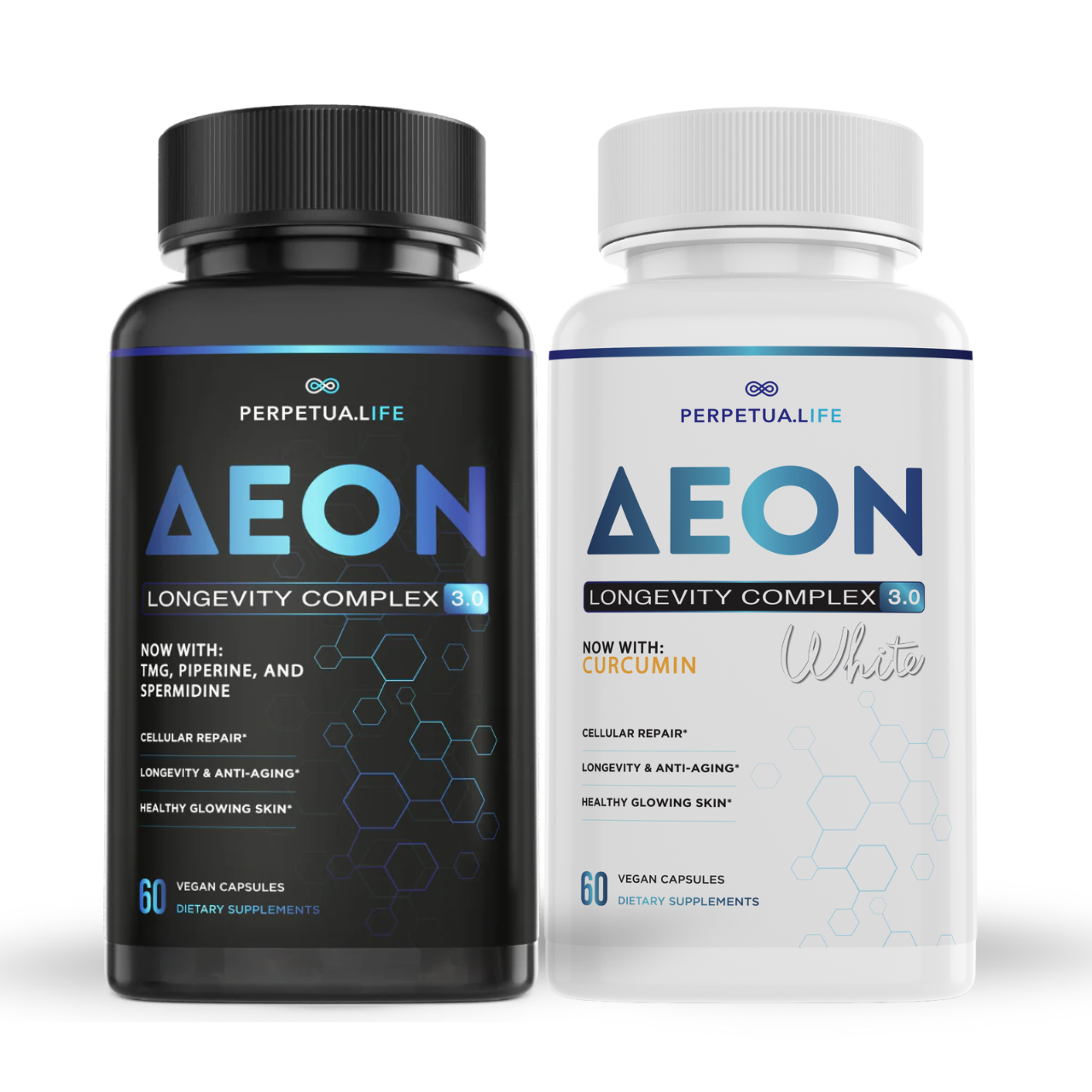
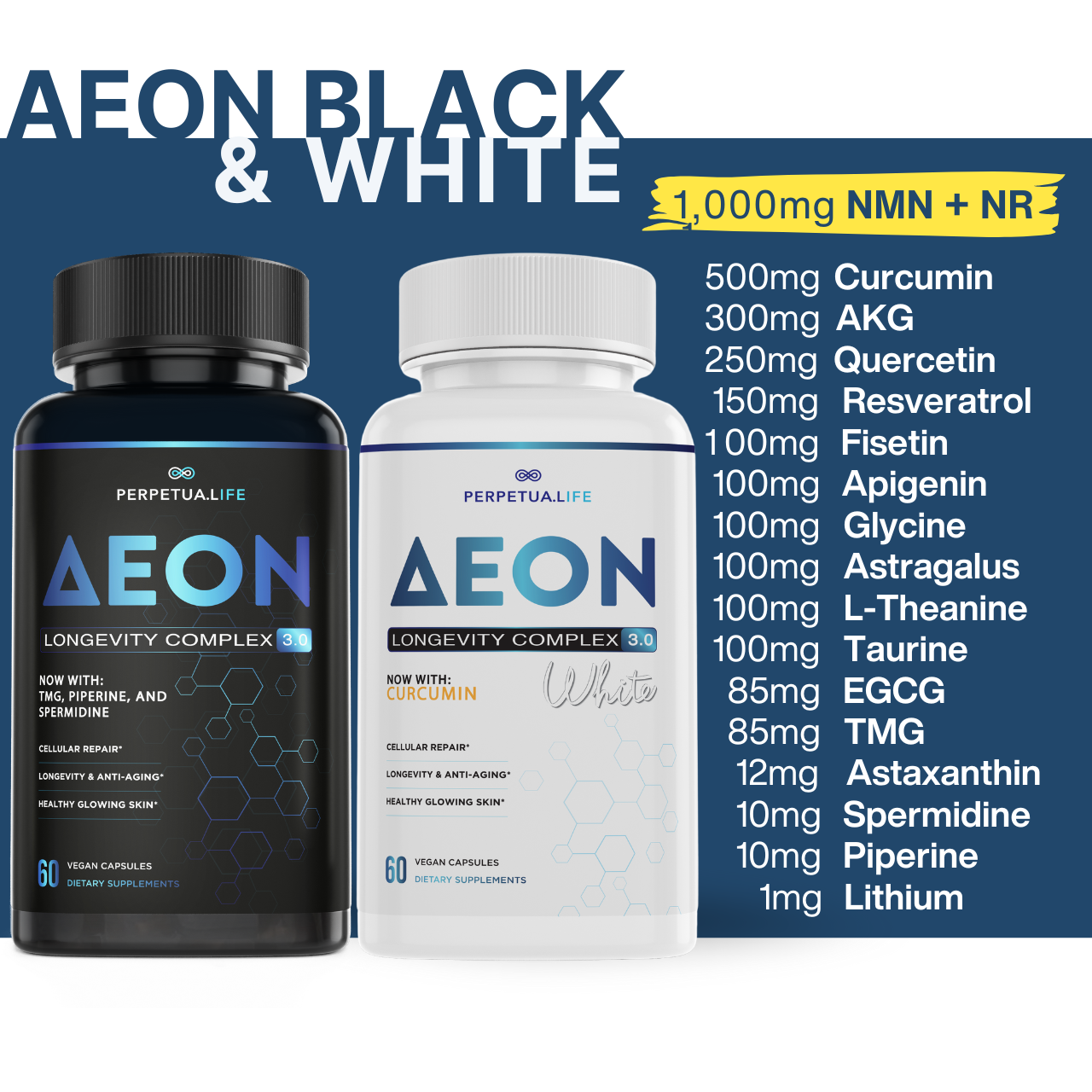
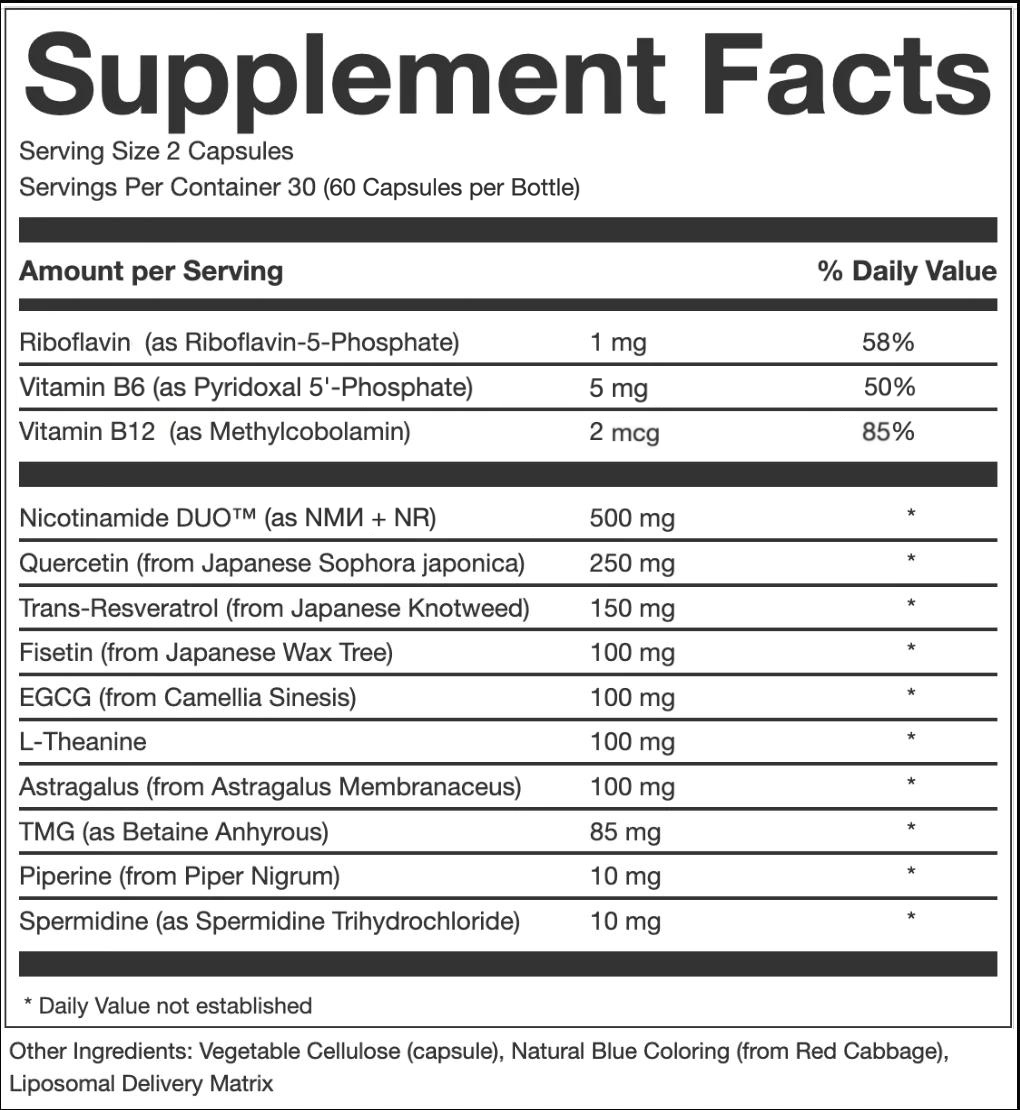
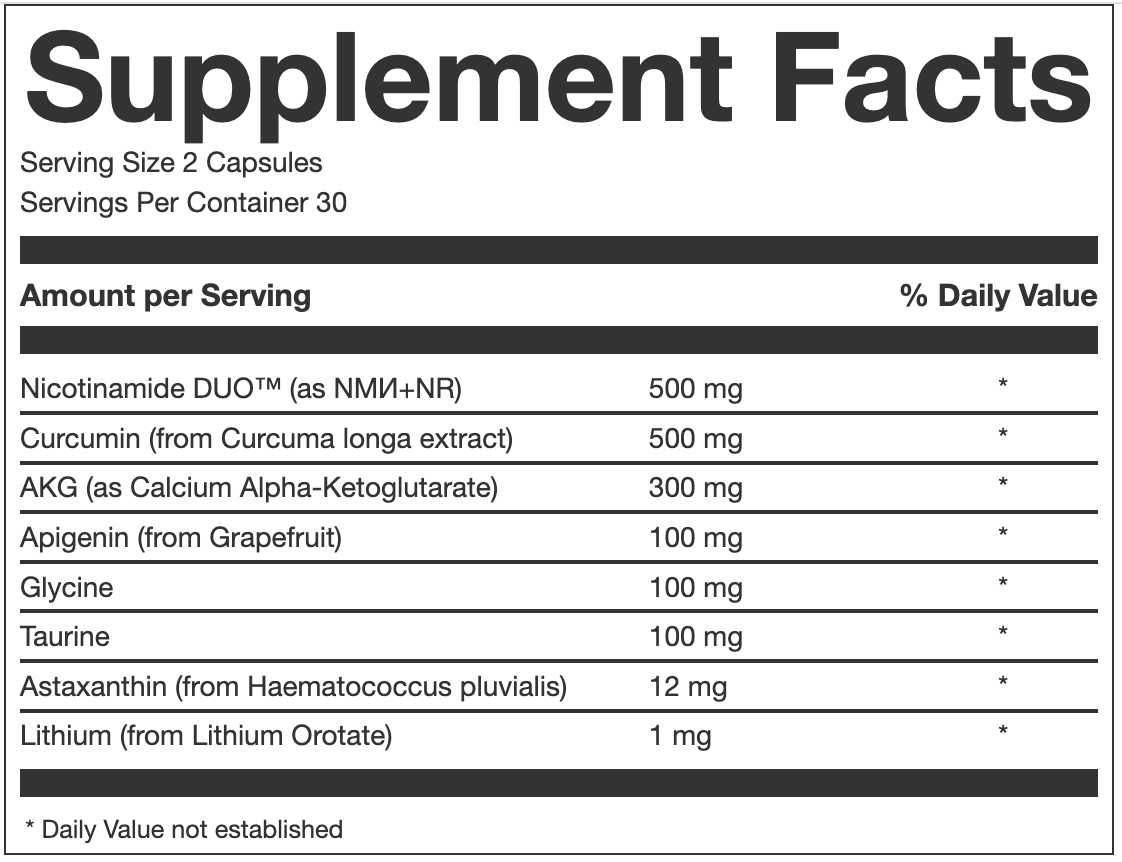
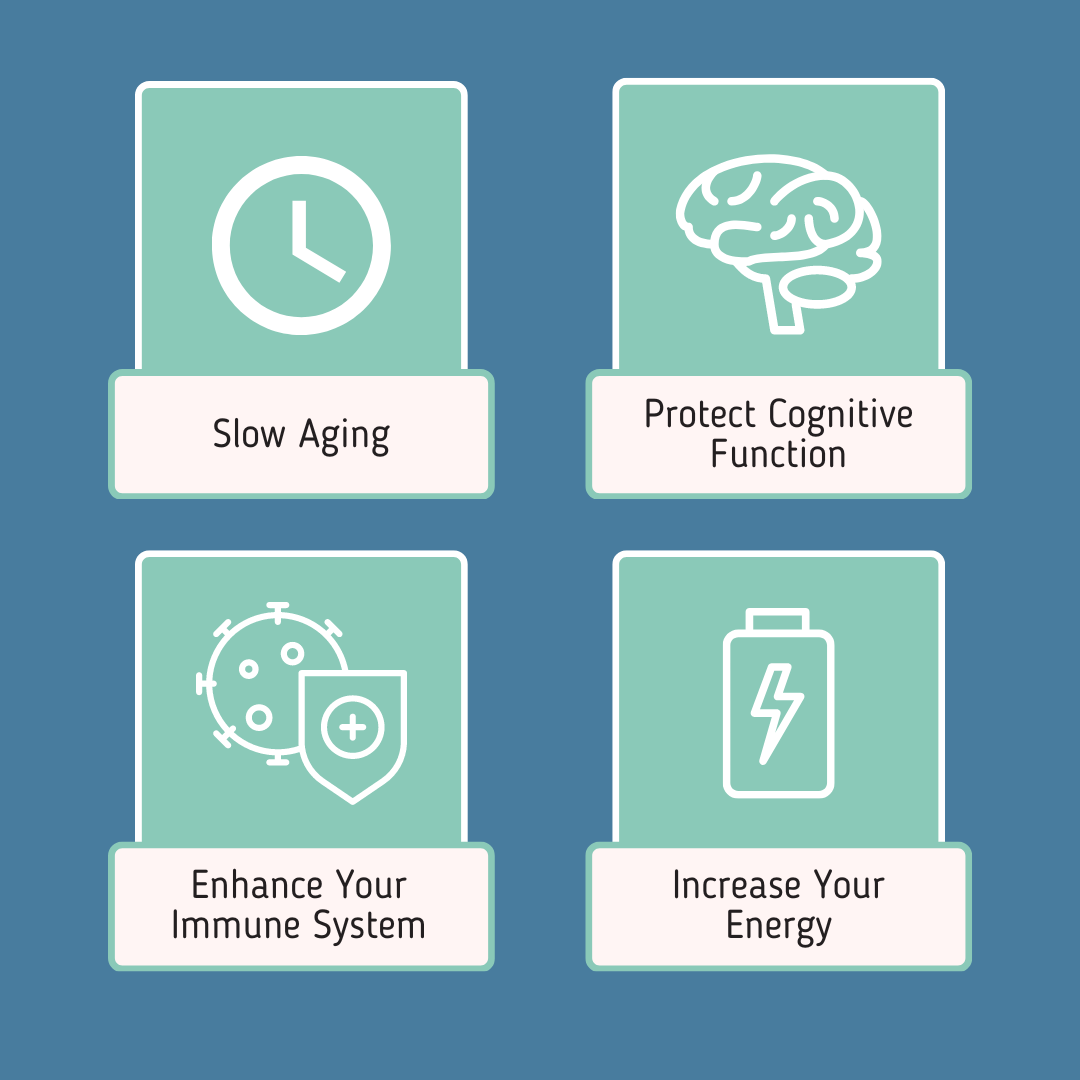

The AEON Longevity Complex Bundle is a synergistic blend of 20+ longevity ingredients shown to reduce the damages of aging.
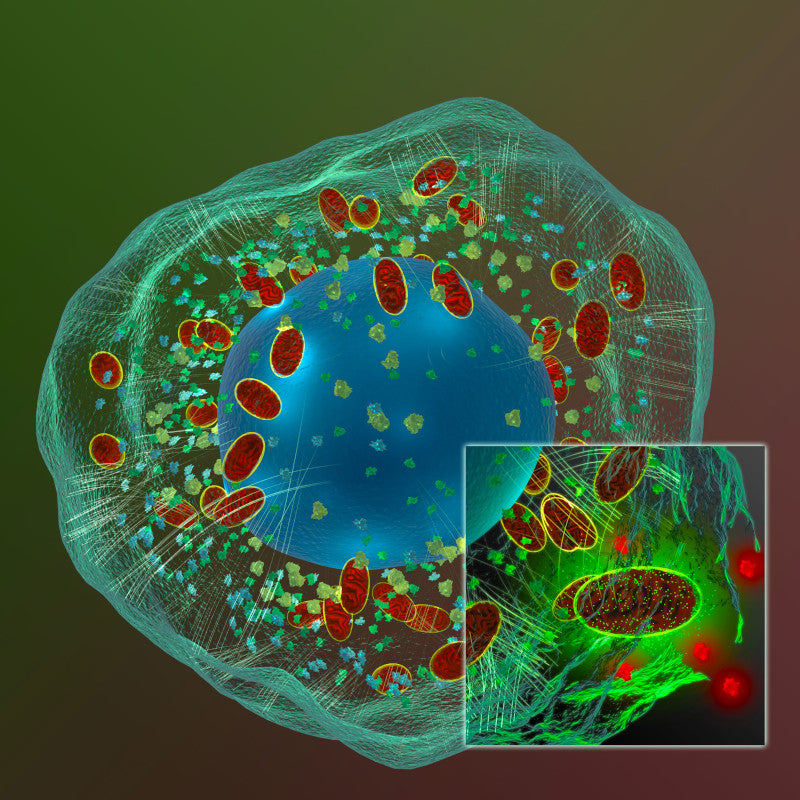
A recent study has shown boosting your NAD+ levels, and supplementing your diet with senolytic compounds like Resveratrol, Fisetin, and Quercetin may reverse age-related decline, and extend human lifespan.
AEON combines NAD+ precursors like NMИ and NR, with Resveratrol, Quercetin, Fisetin, AND 6 other age defying compounds in one affordable product!
We're one of the very few companies who also regularly 3rd party test our products for Heavy Metal contaminants like Lead, Mercury, Cadmium, and Arsenic to make sure you get a safe, and effective product each and every time!
You can view the results HERE.


